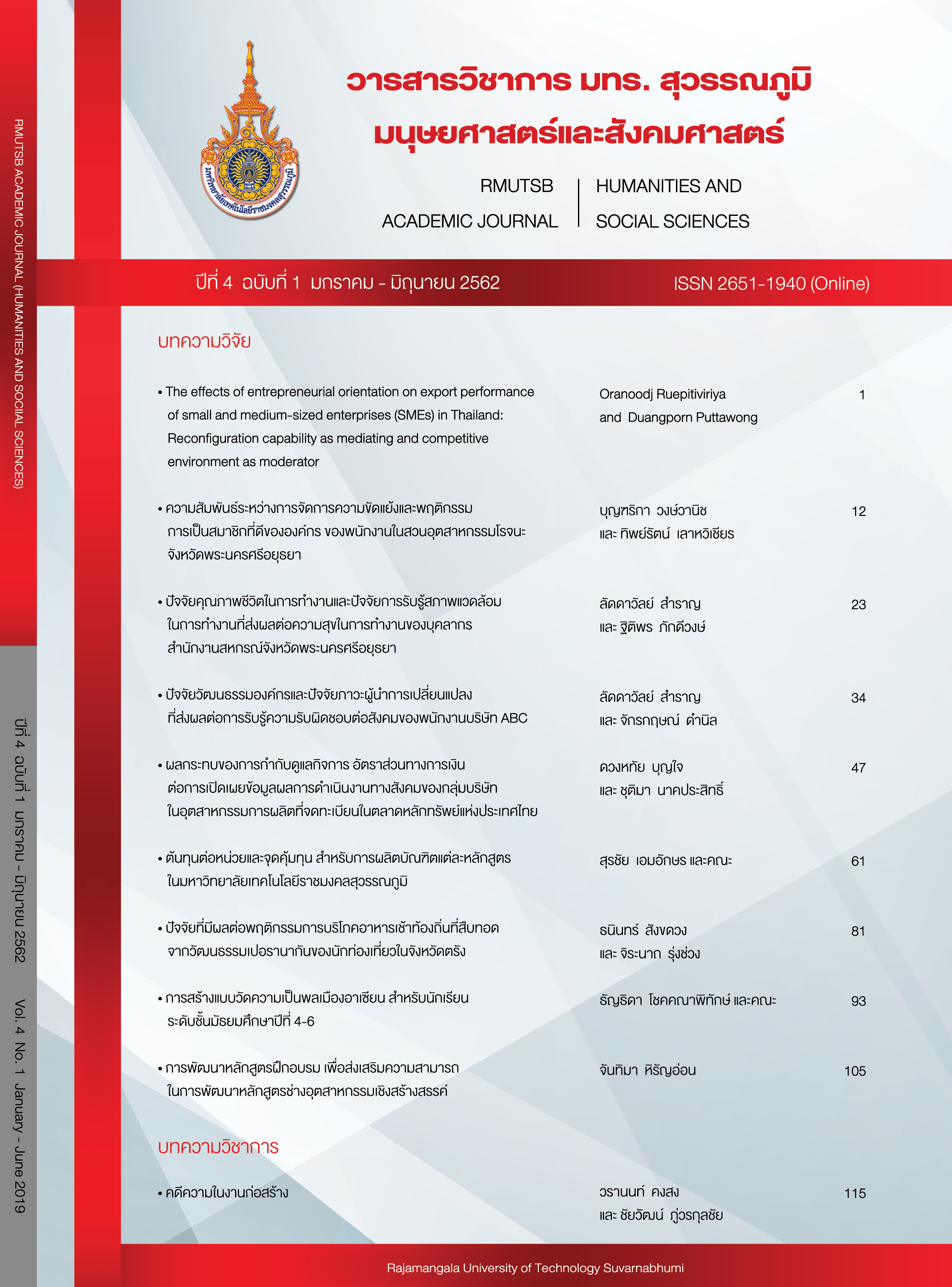Organizational culture factors and transformational leadership factors affecting social responsibility perception of ABC company
Main Article Content
Abstract
This research aimed to study the organizational culture factors and transformational leadership factors that influenced social responsibility perception of ABC employees. The population was 670 employees from the ABC Company. The sample sized of 251 employees, determined by Taro Yamane formula, was selected from the above population. The questionnaire was used as an instrument for data collection in this study. The statistics used for data analysis were frequency, percentage, mean, standard deviation and stepwise multiple regression analysis, setting the significance level at 0.05. The study revealed that respondents’ opinions on ABC Company organizational culture factors, change leadership factor, and social responsibility awareness were at a high level. The hypothesis testing showed that the organizational culture factors which consisted of hierarchical culture, market culture, family-oriented culture, and challenge culture influenced social responsibility perception of employees. It can be used to predict the social responsibility perception of employees up to 78 percent. Similarly, the transformational leadership factors which consisted of intellectual stimulation, inspiration motivation, and individual differences, influenced social responsibility perception of the employees as well. The social responsibility perception of employees can be predicted up to 64 percent.
Article Details
References
ธีรพร ทองขะโชค, และอาคม ใจแก้ว. (2558). ปัจจัยที่มีอิทธิพลต่อความรับผิดชอบต่อสังคมของบริษัทจดทะเบียนในตลาดหลักทรัพย์แห่งประเทศไทย. วารสารวิทยาการจัดการ, 30(1). 23-51.
พิพัฒน์ ยอดพฤติการ. (2551). CSR ในมุมมองของ OECD. สืบค้น 10 มกราคม 2562, จาก https://pipatory.Bloggspot.com/2008/04/csr-oecd.html
ไพบูลย์ วัฒนศิริธรรม. (2549). บทนำ. CSR Journal, 19, 3.
ภิรมย์ ถิ่นถาวร. (2550). การศึกษาภาวะผู้นำการเปลี่ยนแปลงของผู้บริหารสถานศึกษาตามการรับรู้ของข้าราชการครูโรงเรียนอำเภอบ้านโพธิ์ สังกัดสำนักงานเขตพื้นที่การศึกษาฉะเชิงเทรา เขต 1 (วิทยานิพนธ์ปริญญามหาบัณฑิต). มหาวิทยาลัยบูรพา, ชลบุรี.
รัตติกรณ์ จงวิศาล. (2551). มนุษยสัมพันธ์: พฤติกรรมมนุษย์ในองค์การ. กรุงเทพฯ: สำนักพิมพ์มหาวิทยาลัยเกษตรศาสตร์.
วรวุฒิ ไชยศร. (2561). ผลวิจัยซีเอสอาร์ 6 ยักษ์ธุรกิจ สะท้อนการขับเคลื่อนองค์กรที่ยั่งยืน MGR Online. สืบค้น 10 มกราคม 2562, จาก https://mgronline.com/greeninnovation/detail/9610000009339.
วิรัช สงวนวงศ์วาน. (2547). การจัดการและพฤติกรรมองค์กร. กรุงเทพฯ: เพียร์สัน เอ็ดดูเคชั่น
สุนทร วงศ์ไวศยวรรณ. (2540). วัฒนธรรมองค์การ. กรุงเทพฯ: มหาวิทยาลัยสุโขทัยธรรมาธิราช.
อุดมศักดิ์ กุลครอง (2553). ภาวะผู้นำการเปลี่ยนแปลงกับความรับผิดชอบต่อสังคมของผู้บริหารสถานศึกษา (วิทยานิพนธ์ปริญญามหาบัณฑิต). มหาวิทยาลัยศิลปากร, กรุงเทพฯ.
Bass, B. M., & Avolio, B. J. (1994). Improving organization effectiveness through transformational. Thousand Oaks, CA: Sage.
Cameron, K. S., & Quinn, R. E. (1999). Diagnosing and changing organizational culture. New York: Addison Wesley Publishing.
Cameron, K. S., & Quinn, R. E. (2006). Diagnosing and changing organization culture: Based on the competing values framework. Sanfrancisco, CA: Jossey-Bass.
Galbreath, J. (2010). Drivers of corporate social responsibility: the role of formal strategic planning and firm culture. British Journal of Management, 21(2), 511-525.
Griffin, R. W. (1996). Management (5th ed.). Boston: Houghton Mifflin.
Yamane, T. (1973). Statistics: An introductory analysis (3rd ed.). New York. Harper and Row Publications.


